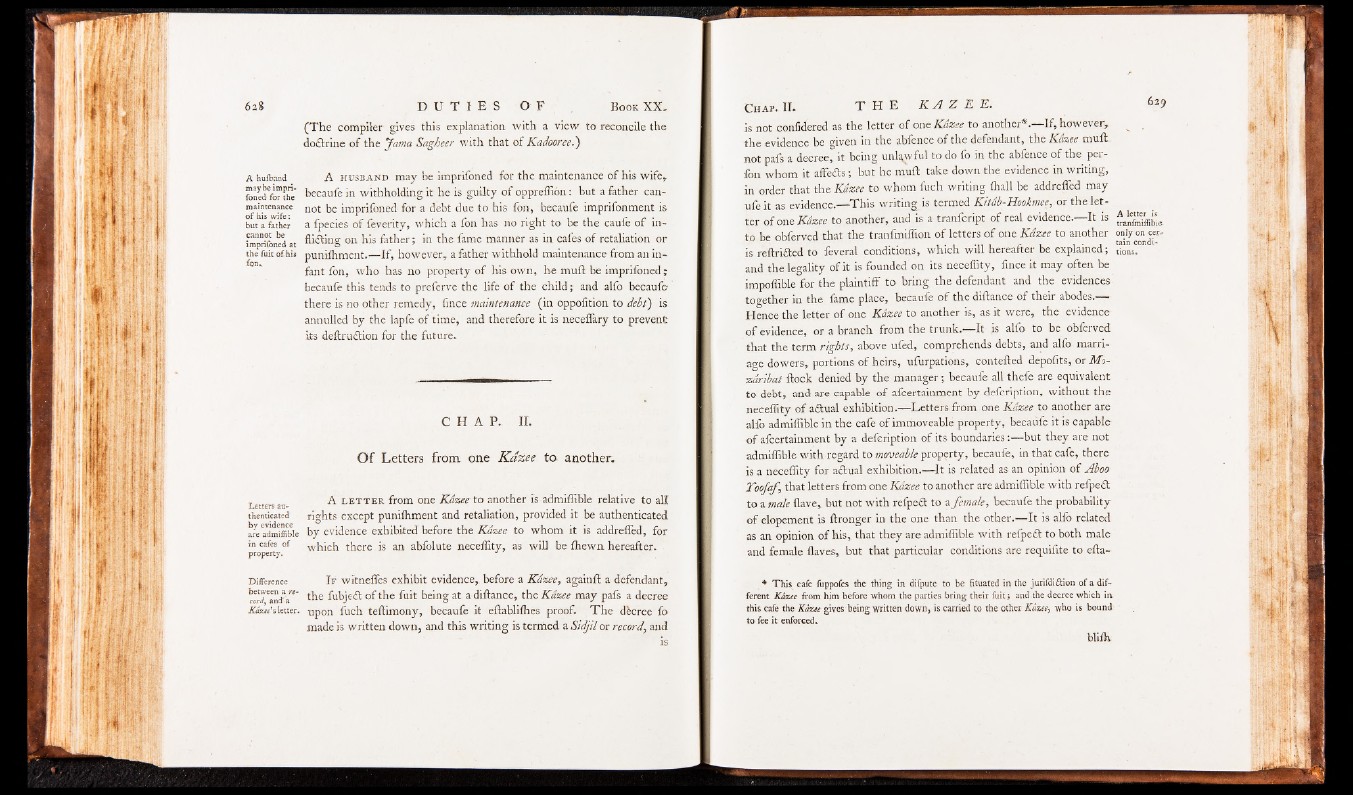
(The compiler gives this explanation with a view to reconcile the
doctrine of the Jama Sagheer with that of Kadooree.)
A hufband A husband may be imprifoned for the maintenance of his wife,
Sn^ foTfhe becaufe in withholding it he is guilty of oppreffion: but a father canmamtenanre
not be imprifoned for a debt due to his fon, becaufe imprifonment is
but a father a fpecies of feverity, which a fon has no right to be the caufe of incannot
be f ly in g on his father; in the fame manner as in cafes of retaliation or impnionea at o
the fuitofhis punilhment.— If, however, a father withhold maintenance from an infant
fon, who has no property of his own, he mull be imprifoned;
becaufe this tends to preferve the life of the child; and alfo becaufe
there is no other remedy, fince maintenance (in oppolition to debt) is
annulled by the lapfe of time, and therefore it is neceflary to prevent
ks deftruction for the future.
C H A P . II.
Of Letters from one Kdzee to another.
. A l e t t e r , from one Kdzee to another is admiflible relative to all
Letters au- , . . . . . .
thendcated rights except punilhment and retaliation, provided it be authenticated
are admirable by evidence exhibited before the Kdzee to whom it is addrefled, for
in cafes of -which there is an abfolute neceffity, as will be Ihewn hereafter.
property. J
Difference I f witnefles exhibit evidence,, before a Kdzee, again!! a defendant,
w'J'antfY*" the fubject of the fuit being at a diftanee, the Kdzee may pafs a decree
Kdztt’ s letter, upon fuch teftimony, becaufe it eftablilhes proof. The decree fo
made is written down, and this writing is termed a Sidjil or record, and
is
is not confidered as the letter of one KaZee to another^» If, however^
the evidence be given in the ablence of the defendant, the Kazee mulb
not pals a decree, it being unlawful to do fo in the ablence of the per-
fon whom it afoefts; but he mull take down the evidence in writing,
in order that the Kdzee to whom fuch writing lhall be addrefled may
ufe it as evidence.— This writing^ is termed Kitdb-Hookmee, or the letter
of one Kdzee to another, and is a tranfcript of real evidence.— It is
to be obferved that the tranfmiflion of letters of one Kdzee to another
is reftrifted to feveral conditions, which will hereafter be explained;
and the legality of it is founded on its neceffity, fince it may often be
impoflible for the plaintiff to bring the defendant and the evidences
together in the fame place, becaufe o f the diftanee of their abodes.—
Hence the letter of one Kdzee to another is, as it were, the evidence-
of evidence, or a branch from the trunk.— It is alfo to be obferved
that the term rights, above uled, comprehends debts, and alfo marriage
dowers, portions of heirs, ufurpation-s, contefted depolits, or Mo-
zdribat flock denied by the manager; becaufe all thefe are equivalent
to debt, and are capable of afeertainment by defeription, without the
neceffity of actual exhibition.— Letters from one Kdzee to another are
alfo admiflible in the cafe of immoveable property, becaufe it is capable
of afeertainment by a defeription of its boundaries:— but they are not
admiflible with regard to moveable property, becaufe, in that cafe, there
is a neceffity for aftual exhibition.— It is related as an opinion of Aboo>
Toofaf, that letters from one Kdzee to another are admiflible with refpedt
to a male Have, but not with refpedl to a female, becaufe the probability
of elopement is ftronger in the one than the other.— It is alfo related
as an opinion of his, that they are admiflible with refpedl to both male
and female Haves, but that particular conditions are requilite to efta-
* T h is cafe fuppofes the thing in difpute to be lituated in the jurifdi&ion o f a different
Kazee from him before whom the parties bring their fait j and the decree which in
this cafe the Kazee gives being written down, is carried to the other Kazee, who is bound
to fee it enforced.
A letter is
tranfmiffibie.
only on cer^
tain conditions.
blilk